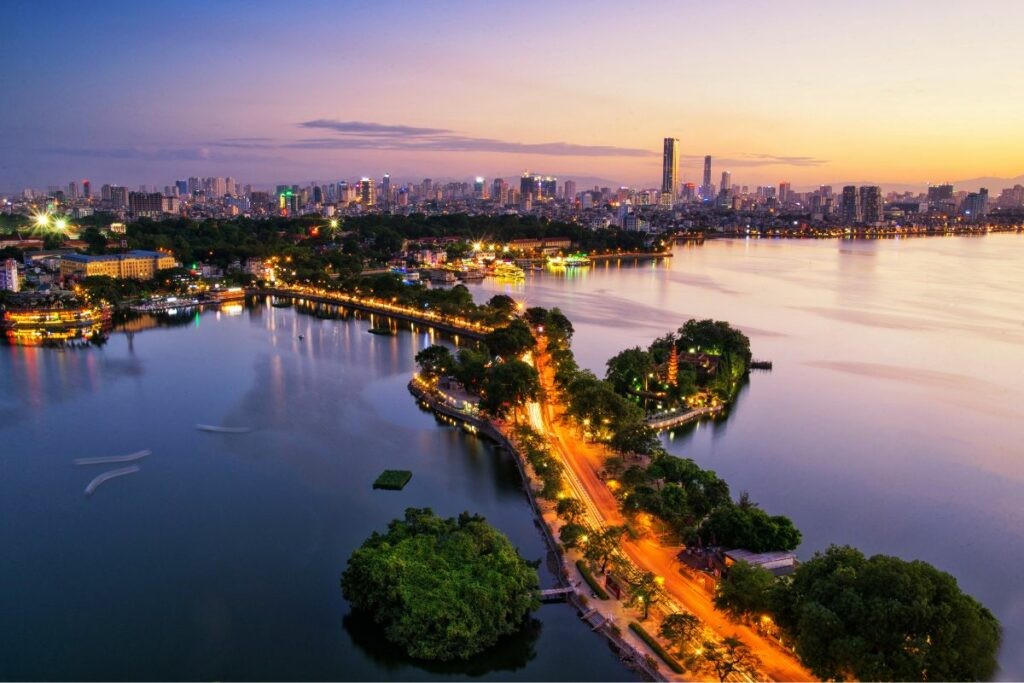Working remotely from Hanoi on a tourist visa? Let SIXT.VN guide you through Vietnam’s visa landscape and help you experience a seamless blend of work and travel. Discover visa options, Hanoi’s digital nomad hotspots, and tips for a productive stay with our travel advice, airport transfers, hotel booking, sightseeing tickets, flight booking, and Hanoi tours.
1. Understanding the Digital Nomad Landscape in Hanoi, Vietnam
Is working remotely from Vietnam, specifically Hanoi, a viable option? While Vietnam doesn’t offer a specific “digital nomad visa,” it presents several alternatives for remote workers. These include visa exemptions, e-visas, and tourist visas. Let’s explore whether you can leverage a tourist visa for your remote work in Hanoi and related guidance with Vietnam travel tips, exploring Hanoi, and remote work essentials.
- Visa Options: Vietnam offers visa exemptions for select nationalities, e-visas for short stays, and tourist visas for longer durations.
- Hanoi’s Appeal: Hanoi, the capital city, attracts digital nomads with its blend of cultural richness, affordable living, and burgeoning coworking scene.
 Hanoi Skyline and Street View
Hanoi Skyline and Street View
2. Deciphering Vietnam’s Visa Regulations for Remote Work
Is it permissible to engage in remote work while in Hanoi on a tourist visa? Officially, engaging in formal employment is restricted on a tourist visa. However, many digital nomads navigate this by performing remote work for companies outside Vietnam, ensuring they don’t directly engage in the Vietnamese labor market. This section dives into Vietnam travel documents, Vietnam visa requirements for tourists, and legal aspects of remote work.
- Tourist Visa Limitations: Tourist visas primarily cater to tourism and leisure activities.
- Remote Work Nuances: Working for foreign entities while on a tourist visa is a gray area, necessitating careful consideration of local regulations. According to the Vietnam National Authority of Tourism, foreign visitors need to adhere to the stated purpose of their visa.
- Navigating Regulations: SIXT.VN ensures you have the most current information and resources to ensure compliance with regulations.
3. Tourist Visa as a Digital Nomad: Possibilities & Restrictions
How can you maximize a tourist visa for remote work while respecting local laws? While a tourist visa isn’t designed for employment, it can serve as a temporary solution. It’s crucial to avoid activities that could be construed as formal employment within Vietnam, such as working for a local company. Here we discuss options for extending stay in Vietnam, combining travel and work, and adhering to visa conditions.
- Temporary Solution: A tourist visa allows you to experience Hanoi’s work-life balance temporarily.
- Avoiding Conflicts: Refrain from engaging in local employment to avoid visa complications.
- Visa Extensions: If you’re looking to extend your stay, contact SIXT.VN for options and advice.
4. Alternative Visa Options for Digital Nomads in Vietnam
What if you want a more secure and extended stay for remote work? Vietnam offers e-visas and business visas that may be more suitable for digital nomads seeking longer durations. Let’s consider eligibility for different visa types, long-term visa options, and transitioning from tourist to business visa.
- E-Visa: A convenient online visa option for a 30-day stay, available to many nationalities. According to the Vietnam Immigration Department, the e-visa is designed for tourism and short-term visits.
- Business Visa: If your remote work involves collaborations with Vietnamese businesses, a business visa might be the right choice.
- Work Visa: If you have a formal offer of employment from a Vietnamese company, this is the most suitable visa option.
5. Requirements & Eligibility for Vietnam Visas
What are the essential requirements for obtaining a Vietnam visa? Regardless of the visa type, having a valid passport, a completed application form, and necessary supporting documents is crucial. The specific requirements vary based on the visa type you’re applying for. Below we discuss passport validity, necessary documents, and visa application processes.
- Passport: Ensure your passport is valid for at least six months from your entry date.
- Application Form: Fill out the visa application form accurately and truthfully.
- Supporting Documents: Provide all required documents, such as flight itineraries, accommodation bookings, and a passport-sized photo.
 Vietnam Visa Requirements
Vietnam Visa Requirements
6. Navigating Visa On Arrival (VOA) for Remote Work in Hanoi
What is the Visa On Arrival (VOA) process, and how does it work? VOA is a convenient option, especially for air travelers. It involves obtaining an approval letter online before your trip and then receiving your visa upon arrival at a Vietnamese airport. The following explains getting pre-approval letters, airport procedures, and VOA fees and processing times.
- Pre-Approval Letter: Apply for an approval letter through a reputable online agency.
- Airport Procedures: Present your approval letter, passport, and completed entry/exit form at the VOA counter.
- Stamping Fee: Pay the visa stamping fee in cash (usually around $25-$50 USD).
7. Income Requirements for Vietnam Visas
Does Vietnam have specific income requirements for digital nomads? Unlike some countries, Vietnam doesn’t impose explicit income thresholds for standard visas. However, demonstrating sufficient funds to cover your expenses during your stay is advisable. Here we discuss financial stability, proof of funds, and supporting your stay in Vietnam.
- Financial Stability: Ensure you have enough money to support yourself during your stay.
- Proof of Funds: Carry bank statements or other financial documents as evidence of your financial stability.
8. Applying for a Vietnam Visa: Step-by-Step Guide
What are the step-by-step procedures for applying for a Vietnam visa? Whether you’re applying for an e-visa or a VOA, understanding the application process is crucial. The process of determining the right visa, online application, and receiving your visa is provided.
- Determine Your Visa Type: Choose the visa that best suits your needs and duration of stay.
- Online Application: Fill out the online application form, providing accurate details.
- Await Approval: Depending on the visa type, wait for the approval letter or e-visa to be issued.
- Travel to Vietnam: Present your visa or approval letter upon arrival.
9. Visa Renewal Process in Vietnam
How can you extend your stay in Vietnam if needed? If you wish to stay longer than your initial visa allows, you can apply for a visa renewal through a local travel agency. This involves submitting the required documents and paying the necessary fees. Here are the renewal procedures, local travel agency assistance, and extending your stay options.
- Local Travel Agency: Seek assistance from a reputable travel agency in Vietnam.
- Required Documents: Prepare all necessary documents, such as your passport, visa, and proof of address.
- Renewal Fees: Pay the applicable visa renewal fees.
10. Vietnam Visa Validity Periods
How long are Vietnam visas valid for? Visa validity varies based on the visa type. E-visas are typically valid for 30 days, while tourist visas can range from one to three months. The following offers insights into visa durations, extension options, and planning your stay effectively.
- E-Visa: 30 days
- Tourist Visa: 1-3 months
- Business Visa: Up to 12 months
11. Costs Associated with Vietnam Visas
How much does it cost to obtain a Vietnam visa? Visa fees vary depending on the visa type and your nationality. E-visas generally cost around $25 USD, while VOA involves an online application fee plus a stamping fee upon arrival. Discussed are visa fees, stamping fees, and budgeting for visa expenses.
- E-Visa Fee: $25 USD (non-refundable)
- VOA Fee: Online application fee + $25-$50 USD stamping fee
12. Tax Implications for Digital Nomads in Vietnam
Do digital nomads have to pay taxes in Vietnam? Vietnam imposes a Personal Income Tax (PIT) on residents and non-residents based on their worldwide income and Vietnam-sourced income. If you’re in Vietnam for fewer than 183 days in a 12-month period, you’re usually considered a non-resident for tax purposes. Understanding tax laws, resident vs. non-resident status, and tax rates are included.
- Non-Resident Tax Rate: 20% on Vietnam-sourced income
- Tax Advice: Consult with a tax professional for personalized advice.
13. Processing Times for Vietnam Visas
How long does it take to process a Vietnam visa? Processing times vary depending on the visa type. E-visas typically take around three working days, while VOA approval letters can take two to four working days. The following offers e-visa processing times, VOA approval times, and planning your travel timeline.
- E-Visa: 3 working days
- VOA Approval: 2-4 working days
14. Bringing Family to Vietnam
Can you bring your family with you if you’re working remotely in Vietnam? Family members will need individual visas to stay in Vietnam, irrespective of your visa type. Spouses and children can apply for dependent visas tied to the primary visa holder’s status. Included are family visa options, eligibility requirements, and planning a family stay.
- Dependent Visas: Spouses and children can apply for dependent visas.
- Individual Requirements: Each family member must meet the visa requirements.
15. Cost of Living in Hanoi for Digital Nomads
What is the cost of living in Hanoi? Hanoi offers an affordable cost of living compared to Western standards. Accommodation, food, and transportation expenses are generally lower. In detail are accommodation costs, food expenses, and transportation options.
- Accommodation: Rent ranges from $200 to $500 USD per month.
- Food: Local meals cost around $2-$5 USD.
- Transportation: Public transport and ride-hailing services are readily available and affordable.
| Expense | Cost (USD) |
|---|---|
| Accommodation | $200 – $500 |
| Food | $150 – $300 |
| Transportation | $50 – $100 |
| Entertainment | $50 – $150 |
| Total (Approx) | $450 – $1050 |
16. Digital Banking Options in Vietnam
What are the digital banking options in Vietnam? Vietnam has seen rapid digitalization in its banking sector, with banks like Vietcombank, Techcombank, and VietinBank offering mobile banking apps. Several fintech startups are also fostering the digital banking ecosystem. Available are mobile banking apps, fintech services, and managing finances digitally.
- Mobile Banking: Use mobile banking apps for balance checks and fund transfers.
- Fintech Startups: Explore fintech services for convenient financial solutions.
17. VPN Recommendations for Digital Nomads in Vietnam
Which VPN works best in Vietnam? ExpressVPN is a popular choice for its fast speeds, strong security features, and ease of use. It ensures uninterrupted online access with privacy. The following presents secure internet access, protecting your data, and maintaining online privacy.
- ExpressVPN: Offers reliable connectivity and strong security.
- NordVPN: Another excellent choice for security and speed.
18. Popular Digital Nomad Hotspots in Hanoi
Where are the best places to live and work in Hanoi? Hanoi offers a blend of old-world charm and modern amenities. The Old Quarter, Tay Ho, and Ba Dinh districts are popular among digital nomads. Listed are coworking spaces, cafes, and exploring Hanoi’s neighborhoods.
- Old Quarter: Experience the city’s historical heart.
- Tay Ho: Enjoy a vibrant expat community and modern amenities.
- Ba Dinh: Explore government buildings and cultural attractions.
19. Coworking Communities in Hanoi
Are there coworking spaces in Hanoi? Yes, Hanoi has several coworking spaces that offer conducive environments for work and networking events. eSpace Coworking Hanoi and HanoiHub are among the best. Also are networking opportunities, community events, and productive workspaces.
- eSpace Coworking Hanoi: A popular coworking space with a supportive community.
- HanoiHub: Offers a range of workspaces and networking events.
 Coworking Spaces in Vietnam
Coworking Spaces in Vietnam
20. Safety Tips for Digital Nomads in Hanoi
Is Hanoi safe for digital nomads? Overall, Hanoi is safe for foreigners, with low crime rates. However, it’s essential to stay cautious in crowded places and invest in travel insurance for peace of mind. Discussed are safety precautions, travel insurance options, and staying secure in Hanoi.
- Stay Alert: Be aware of your surroundings and avoid displaying valuables.
- Travel Insurance: Invest in comprehensive travel insurance.
- Use Reputable Services: Rely on reputable transportation and accommodation services.
21. Pros & Benefits of Working Remotely in Hanoi
What are the advantages of working remotely in Hanoi? From the low cost of living to the diverse landscapes, Hanoi offers a unique experience. The city’s rich history and culture provide endless exploration opportunities, and the growing digital nomad community offers a sense of belonging. The following offers cultural experiences, affordable living, and community support.
- Cultural Immersion: Immerse yourself in Vietnamese culture and traditions.
- Affordable Lifestyle: Enjoy a comfortable lifestyle at a reasonable cost.
- Community: Connect with fellow digital nomads and expats.
22. Potential Drawbacks to Consider
What are some potential drawbacks to consider? The language barrier can be challenging in rural areas, and reliable internet is never guaranteed outside major cities. Traffic in Hanoi can also be chaotic. Language barriers, internet reliability, and traffic conditions are discussed.
- Language Barrier: Learn basic Vietnamese phrases to ease communication.
- Internet Reliability: Research internet options and backup solutions.
- Traffic: Be prepared for heavy traffic, especially during peak hours.
23. Alternative Countries with Similar Requirements
Are there alternative countries with similar digital nomad opportunities? Malaysia, Cambodia, and Turkey offer similar visa options and attractions for digital nomads. Discussed are Malaysia’s digital nomad visa, Cambodia’s simple visa process, and Turkey’s residence permit.
- Malaysia: Offers a mix of urban modernity and lush landscapes.
- Cambodia: Features a low cost of living and growing expat communities.
- Turkey: Serves as a bridge between Europe and Asia with modern amenities and historic charm.
24. FAQs: Working Remotely from Hanoi
24.1 Can you extend your Vietnam digital nomad visa?
Yes, it’s possible to extend your visa, though processes vary based on visa type and duration. Contact SIXT.VN for assistance with visa extensions.
24.2 Do I need a digital nomad visa to work remotely from Vietnam?
No. Many digital nomads work on tourist visas, but you must ensure you adhere to its conditions. Always comply with visa regulations and avoid local employment.
24.3 Do I pay taxes in Vietnam as a digital nomad?
Vietnam imposes a Personal Income Tax (PIT) on residents and non-residents based on their worldwide income and Vietnam-sourced income. Consult a tax professional for advice.
24.4 What to pack when traveling to Vietnam as a digital nomad?
Pack light clothes, essential tech gear, adaptors, and mosquito repellent. Be prepared for varying weather conditions.
24.5 How much does it cost to live in Vietnam as a digital nomad?
Depending on lifestyle and location, living costs usually range from $600 to $1500 monthly. Plan your budget accordingly.
24.6 How long can I live in Vietnam without a visa?
This varies by nationality; some can stay 14-30 days visa-free, while others need a visa upon entry. Check the latest visa exemption policies.
24.7 Can I work in Vietnam on a tourist visa?
It is technically prohibited, but many digital nomads work remotely without local engagements. Ensure you comply with visa regulations.
25. Conclusion: Your Remote Work Adventure in Hanoi Awaits
With its diverse visa options, vibrant coworking spaces, and affordable cost of living, Hanoi presents an enticing destination for digital nomads. Ensure you understand the legal intricacies and are culturally informed to make the most of your experience.
Ready to start your remote work adventure in Hanoi? SIXT.VN offers a range of services to make your stay seamless and enjoyable. Contact us today to explore our travel advice, airport transfers, hotel booking, sightseeing tickets, flight booking, and Hanoi tours.
Address: 260 Cau Giay, Hanoi, Vietnam
Hotline/Whatsapp: +84 986 244 358
Website: SIXT.VN
Let SIXT.VN be your guide to an unforgettable remote work experience in Hanoi.



